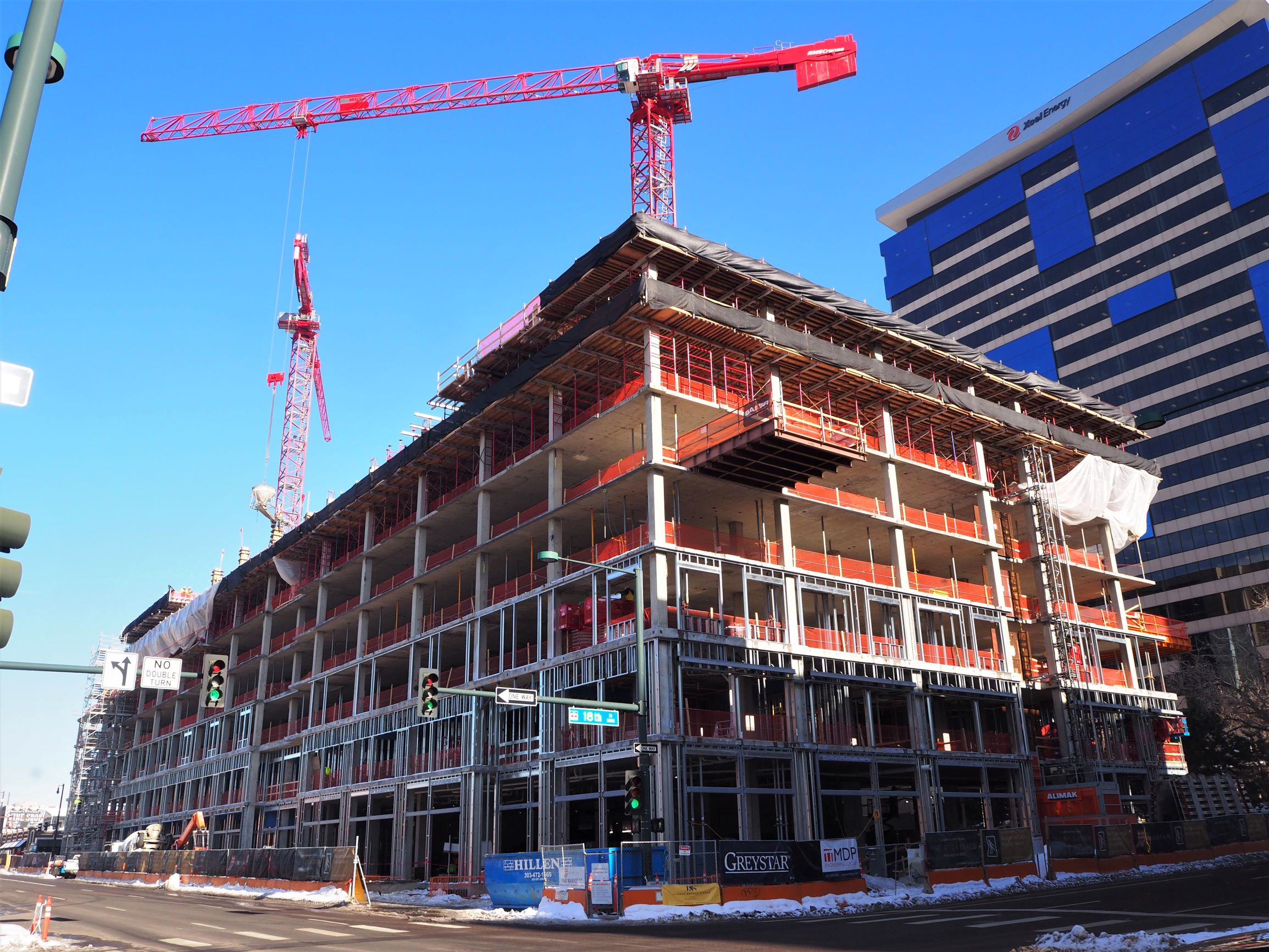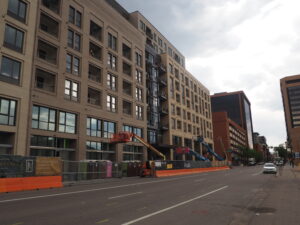Denver jurors were not confused or misled when they absolved an architecture firm of blame for a $20 million flooding incident at The Fitzgerald apartment building in LoDo, a court has found.
“We are confident that the jury understood what obligations the contract required and exactly what breaches (were) alleged,” the Colorado Court of Appeals ruled Nov. 21.
The Fitzgerald, at 18th and Market, broke ground in 2018. It is an 11-story complex of nearly 300 apartments above retail space and, notably, two floors of underground parking. Developed by Greystar, a national housing giant, The Fitzgerald was completed in 2022.
Construction was delayed and made pricier by an incident in November 2020, when the garage floor heaved and water rushed in. Greystar blamed faulty architectural work that failed to account for the hydrostatic pressure of groundwater. It spent $11 million “to remove and replace an entire garage floor slab that spanned half a city block,” the company later recounted.
Then, in 2022, the developer sued the supposed culprits: Denver design firm Johnson Nathan Strohe, an engineering firm out of Virginia and a California consulting company. The latter two settled out of court but Johnson Nathan Strohe refused to do so.
So, a 10-day trial was held in Denver District Court. Greystar argued that JNS, as overseer of the design work, was liable for the $11 million in repairs and $9.5 million in other costs that Greystar supposedly suffered when The Fitzgerald opened in 2022 rather than 2021. JNS blamed the flooding on other companies’ faulty construction, not its design work.
And jurors sided with JNS, awarding Greystar nothing. By virtue of losing the case, the developer was ordered to pay all attorney fees that JNS amassed over 2.5 years.
Before that total could be tallied, Greystar appealed the verdict to the Court of Appeals. It claimed that Judge Jill Dorancy had improperly instructed the jury on what a breach of contract is, leaving them confused and misled. But the Court of Appeals disagreed.
“Nothing in the record shows the jury was confused,” a three-judge panel wrote. “Though the jury asked questions throughout the trial, including during its deliberations, it never asked the court to clarify the instruction or otherwise expressed confusion about that.”
Attorneys for the two sides declined to comment on the court’s opinion. They are Patrick Casey, Risa Brown and Spencer Sears of the Fox Rothschild firm for Greystar, and Daniel Woodward and Timothy Schulte with the law firm Cardi and Schulte for Johnson Nathan Strohe.
Denver jurors were not confused or misled when they absolved an architecture firm of blame for a $20 million flooding incident at The Fitzgerald apartment building in LoDo, a court has found.
“We are confident that the jury understood what obligations the contract required and exactly what breaches (were) alleged,” the Colorado Court of Appeals ruled Nov. 21.
The Fitzgerald, at 18th and Market, broke ground in 2018. It is an 11-story complex of nearly 300 apartments above retail space and, notably, two floors of underground parking. Developed by Greystar, a national housing giant, The Fitzgerald was completed in 2022.
Construction was delayed and made pricier by an incident in November 2020, when the garage floor heaved and water rushed in. Greystar blamed faulty architectural work that failed to account for the hydrostatic pressure of groundwater. It spent $11 million “to remove and replace an entire garage floor slab that spanned half a city block,” the company later recounted.
Then, in 2022, the developer sued the supposed culprits: Denver design firm Johnson Nathan Strohe, an engineering firm out of Virginia and a California consulting company. The latter two settled out of court but Johnson Nathan Strohe refused to do so.
So, a 10-day trial was held in Denver District Court. Greystar argued that JNS, as overseer of the design work, was liable for the $11 million in repairs and $9.5 million in other costs that Greystar supposedly suffered when The Fitzgerald opened in 2022 rather than 2021. JNS blamed the flooding on other companies’ faulty construction, not its design work.
And jurors sided with JNS, awarding Greystar nothing. By virtue of losing the case, the developer was ordered to pay all attorney fees that JNS amassed over 2.5 years.
Before that total could be tallied, Greystar appealed the verdict to the Court of Appeals. It claimed that Judge Jill Dorancy had improperly instructed the jury on what a breach of contract is, leaving them confused and misled. But the Court of Appeals disagreed.
“Nothing in the record shows the jury was confused,” a three-judge panel wrote. “Though the jury asked questions throughout the trial, including during its deliberations, it never asked the court to clarify the instruction or otherwise expressed confusion about that.”
Attorneys for the two sides declined to comment on the court’s opinion. They are Patrick Casey, Risa Brown and Spencer Sears of the Fox Rothschild firm for Greystar, and Daniel Woodward and Timothy Schulte with the law firm Cardi and Schulte for Johnson Nathan Strohe.




